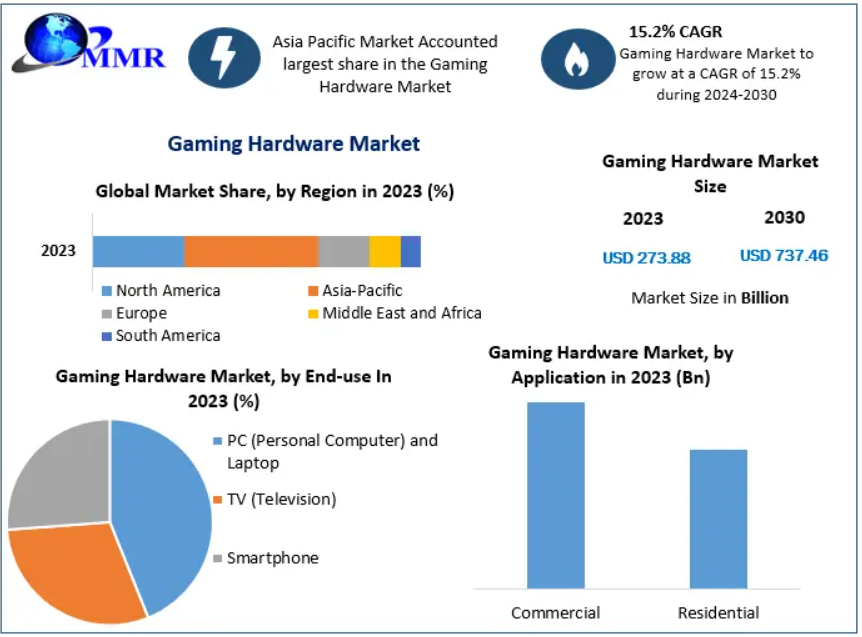Global Gaming Hardware Market Poised to Reach $737.46 Billion by 2030, Driven by Technological Innovations and Rising Gamer Demographics
The Global Gaming Hardware Market Size is on a trajectory of unprecedented growth, with projections estimating its value to reach $737.46 billion by 2030, expanding at a compound annual growth rate (CAGR) of 15.2% during the forecast period. This surge is fueled by rapid technological advancements, the proliferation of high-speed internet, and an expanding base of gaming enthusiasts worldwide.
Market Definition and Evolution
Gaming hardware encompasses the physical devices and equipment used to play video games, including consoles, personal computers (PCs), accessories, and peripherals. Historically, console gaming hardware undergoes a replacement cycle of approximately 5 to 7 years, aligning with technological innovations and consumer demand for enhanced gaming experiences. The continuous evolution in this sector reflects the industry's commitment to delivering immersive and high-performance gaming solutions.
For in-depth information on this study, visit the following link:https://www.maximizemarketresearch.com/request-sample/55239/
Drivers of Market Growth and Emerging Opportunities
Several key factors are propelling the expansion of the gaming hardware market:
-
Technological Innovations: The integration of cutting-edge technologies such as Artificial Intelligence (AI) and the Internet of Things (IoT) into gaming hardware has revolutionized user experiences, offering more interactive and personalized gameplay.
-
Advent of 5G Networks: The rollout of 5G technology has significantly enhanced the speed and responsiveness of wireless networks, facilitating seamless online gaming and opening new avenues for cloud-based gaming services.
-
Rise of eSports and Multiplayer Gaming: The burgeoning popularity of eSports and multiplayer gaming has escalated the demand for high-performance gaming hardware, as players seek competitive advantages through superior equipment.
-
Increasing Disposable Income: Higher disposable incomes globally have enabled consumers to invest more in premium gaming hardware, driving market growth.
-
Expansion of Cloud Gaming Services: The development and adoption of cloud gaming services present lucrative opportunities, allowing gamers to access high-quality games without the need for expensive hardware.
In-Depth Segmentation Analysis
The gaming hardware market is segmented based on product type, end-user, and application, each contributing uniquely to the market dynamics.
-
By Product Type:
-
Consoles: Dominating the market with a significant share, consoles remain the preferred choice for many gamers. The launch of next-generation consoles like PlayStation 5 and Xbox Series X/S has invigorated this segment, offering enhanced graphics and processing capabilities.
-
Accessories: This segment includes peripherals such as controllers, headsets, and virtual reality (VR) devices. The increasing popularity of VR gaming has particularly boosted the demand for advanced accessories that provide immersive experiences.
-
-
By End-User:
-
Commercial: Accounting for a substantial portion of the market revenue, the commercial segment encompasses gaming lounges, eSports arenas, and other public gaming venues. The rise of eSports tournaments and gaming cafes has significantly contributed to this segment's growth.
-
Residential: The residential segment caters to individual consumers investing in gaming setups for personal use. The COVID-19 pandemic accelerated this trend, as more individuals sought in-home entertainment options.
-
-
By Application:
-
PCs and Laptops: The PC gaming segment is experiencing robust growth due to the widespread adoption of PC gaming and the high computational requirements of modern, high-definition games.
-
Televisions (TVs): The growing adoption of smart TVs compatible with gaming consoles has propelled this segment, offering users a seamless and integrated gaming experience.
-
Smartphones: The ubiquity of smartphones and the rise of mobile gaming have opened new avenues for gaming hardware, including specialized controllers and accessories designed for mobile devices.
-
Country-Level Insights: Focus on the USA and Germany
-
United States: As a global leader in the gaming industry, the U.S. boasts a well-established gaming culture with a significant number of enthusiasts. The presence of major gaming hardware manufacturers such as Microsoft, Sony, and Nintendo has solidified its market dominance. The introduction of new technologies and the increasing popularity of eSports have further fueled the demand for advanced gaming hardware in the country.
-
Germany: Germany's gaming hardware market is characterized by a strong emphasis on high-quality audio and speaker technology, with companies specializing in peripheral devices and cooling systems. While revenues may not match those of global giants, Germany's focus on specialized, high-quality products has carved a niche in the gaming hardware landscape.
To access more details regarding this research, visit the following webpage:https://www.maximizemarketresearch.com/market-report/global-gaming-hardware-market/55239/
Competitive Landscape and Key Players
The gaming hardware market is highly competitive, with several key players driving innovation and market expansion:
-
Sony Corporation: Renowned for its PlayStation series, Sony continues to be a dominant force in the console market, offering cutting-edge technology and exclusive gaming titles.
-
Microsoft Corporation: With its Xbox series, Microsoft has consistently delivered high-performance gaming consoles and is investing heavily in cloud gaming services to enhance user experience.
-
Nintendo Co. Ltd.: Known for its innovative approach, Nintendo has captured a significant market share with products like the Nintendo Switch, appealing to both casual and hardcore gamers.
-
NVIDIA Corporation: A leader in graphics processing units (GPUs), NVIDIA's technologies are integral to high-performance gaming PCs and laptops, driving advancements in visual quality and processing power.
-
Logitech International S.A.: A major player in gaming accessories, Logitech continues to introduce high-quality gaming keyboards, mice, and headsets, catering to professional and casual gamers alike.
Conclusion
The global gaming hardware market is entering an exciting phase of technological transformation, with innovations in AI, 5G, and cloud gaming playing pivotal roles in reshaping the industry. As consumer demand for immersive and high-performance gaming experiences grows, key industry players are expected to leverage new opportunities to expand their market presence. With significant growth prospects across diverse segments and regions, the gaming hardware industry is set to redefine the future of interactive entertainment.
